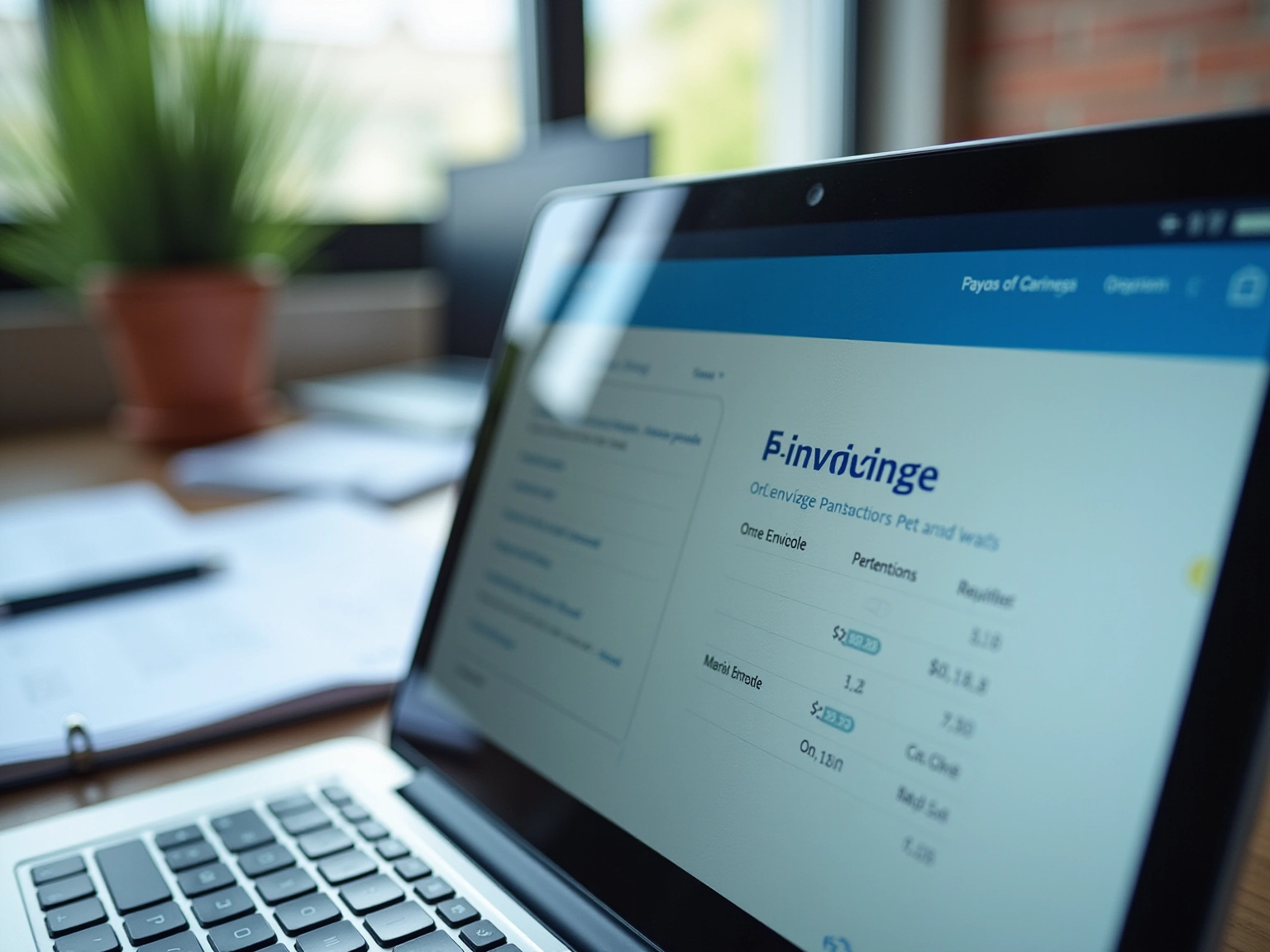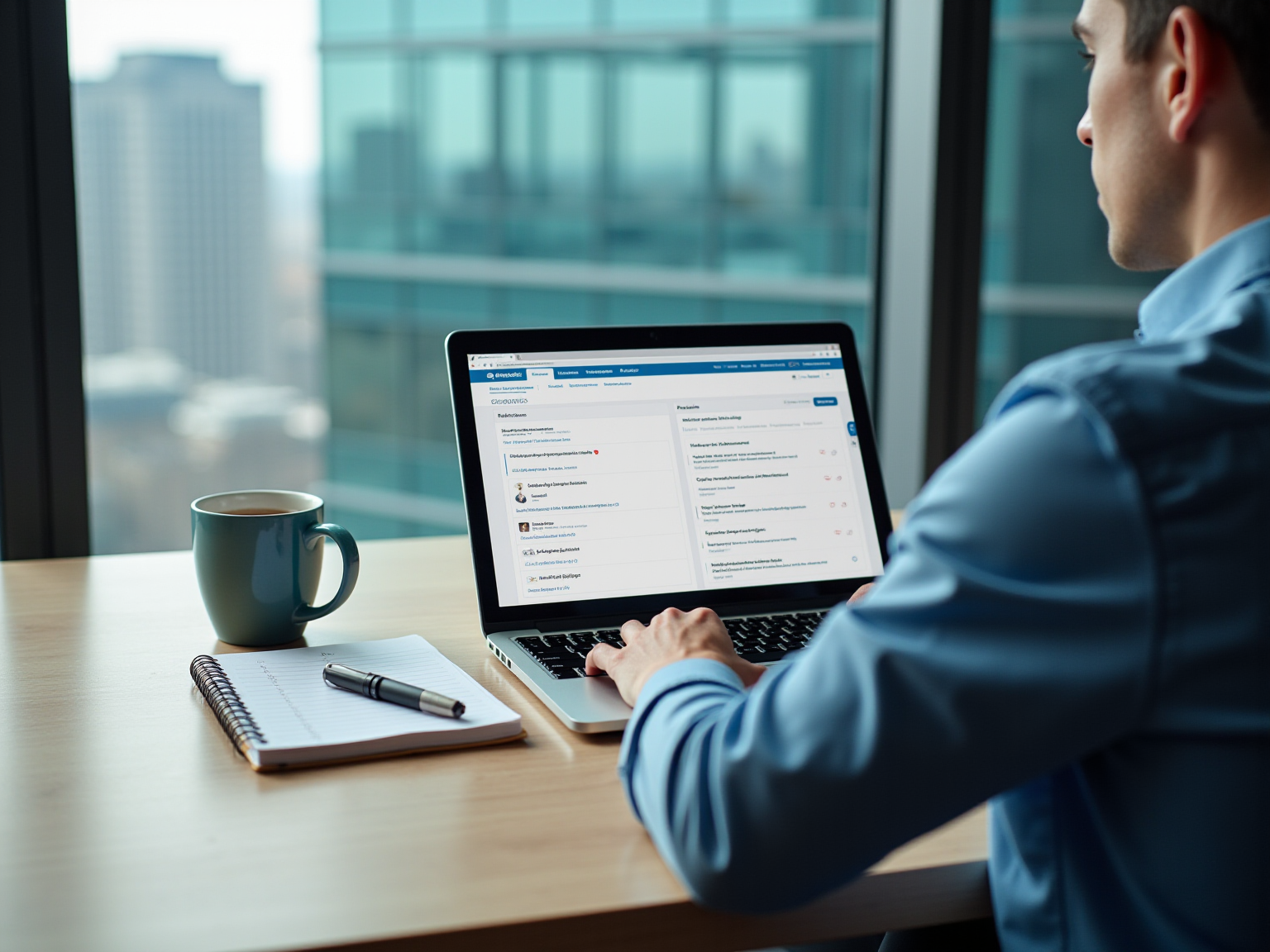Overview
This article presents ten innovative ideas for accountants aimed at enhancing efficiency. By focusing on technologies such as AI, cloud-based systems, and automation tools, it highlights how these advancements streamline workflows and improve client engagement. In a landscape where manual tasks can hinder productivity, these technologies significantly reduce such burdens, enhance data accuracy, and foster better communication. Ultimately, they allow accountants to dedicate more time to strategic advisory roles, thereby improving overall operational effectiveness. Embrace these advancements to transform your accounting practice.
Key Highlights:
- Glasscubes simplifies data collection for tax, audit, and payroll, saving financial professionals up to 288 hours in a tax season.
- The platform centralises client interactions and automates reminders, improving organisation and communication.
- Users report a 40% increase in client response rates and a 50% reduction in response times due to automated notifications.
- Cloud-based accounting systems enhance data management and collaboration, providing real-time updates and secure storage.
- AI automates routine tasks, reducing human error and processing speeds, allowing accountants to focus on advisory roles.
- Blockchain technology enhances transaction security and trust, reducing fraud and streamlining compliance processes.
- OCR digitises documents, significantly speeding up data entry and improving accuracy in financial processes.
- RPA automates repetitive tasks, increasing productivity and allowing accountants to concentrate on higher-value activities.
- Data analytics tools provide insights for strategic decision-making, enhancing accountants’ roles as trusted advisers.
- Digital payment solutions improve cash flow management, with e-invoicing reducing customer response times by 50%.
- Next-generation mobile apps enhance flexibility, enabling finance professionals to manage tasks remotely and improve customer engagement.
- Integrated accounting software consolidates financial functions, improving data accuracy and operational efficiency.
Introduction
As the accounting landscape evolves, technology plays an increasingly pivotal role in enhancing efficiency and client engagement. Current challenges faced by accounting managers demand innovative solutions. From streamlining client communication through robust portals to leveraging cloud-based solutions and AI for automation, accountants are now equipped with powerful tools that redefine their workflows.
The integration of innovative technologies like blockchain, OCR, and RPA not only boosts productivity but also fosters trust and security in financial transactions. With the rise of data analytics and digital payment solutions, firms can make informed strategic decisions while ensuring timely cash flow management.
This article delves into the transformative impact of these advancements, highlighting how platforms like Glasscubes are revolutionising the way accountants operate and interact with clients. Ultimately, these developments pave the way for a more agile and responsive accounting profession, inviting you to explore how embracing these technologies can elevate your practise.
Glasscubes: Streamline Client Communication and Information Gathering
The Glasscubes platform offers a powerful solution designed to simplify the collection of personal tax, audit, and payroll data for financial professionals. By centralising interactions and automating reminders, it significantly reduces the time these professionals spend seeking information from clients. Users report remarkable time savings; one financial professional noted a reduction of up to 288 hours in a single tax season, as highlighted in a case study on the platform. The system includes automated notifications that pursue clients for replies, ensuring that no inquiries are overlooked and all communication is organised within each audit request.
Moreover, the platform offers innovative ideas for accountants through real-time reporting, enabling them to visualise outstanding requests and queries clearly, thereby enhancing overall productivity. It is also GDPR-compliant, ensuring the secure handling of sensitive customer information. Its intuitive interface requires no training, making it accessible for all team members. This efficiency translates into a 40% increase in client response rates and a 50% reduction in response times, based on user feedback, underscoring the platform’s effectiveness in improving client engagement and communication within financial firms.
Additionally, Glasscubes offers a user-friendly onboarding process and a dedicated customer success manager to help users maximise the platform’s value. As Allison Dunn, Founder of Deliberate Directions, states, “Effective communication can significantly elevate your professional interactions, business strategies, and organisational success,” highlighting how Glasscubes enhances communication and streamlines information collection in the finance sector. Pricing options are flexible, starting with a monthly account fee of £120, with various user licence fees based on the chosen plan, making it a versatile solution for firms of all sizes.
Cloud-Based Accounting Systems: Enhance Data Management and Accessibility
Cloud-based accounting systems empower financial professionals to access monetary information anytime and anywhere, a necessity in today’s dynamic business environment. Firms lacking these systems often grapple with laborious information collation and limited visibility in email communications. Cloud solutions significantly enhance data management by providing real-time updates and secure storage, which are essential for preserving data integrity and compliance.
Furthermore, they facilitate seamless collaboration among team members and partners, ensuring that all stakeholders have access to the most current information. As the adoption of cloud technology escalates—evidenced by the fact that 82% of accountants believe customers expect advanced services—accountants can harness these systems to streamline workflows and elevate service quality.
Notably, companies utilising cloud-based solutions like Glasscubes have reported a 40% increase in customer response rates and a 50% reduction in response times, attributed to features such as automated reminders and real-time visibility into outstanding requests. This underscores the tangible benefits of these technologies in enhancing customer engagement.
With the shift towards strategic roles in finance, as indicated by 45% of professionals, embracing cloud technology is not merely advantageous but essential for boosting efficiency and responsiveness in customer interactions. Moreover, the secure, encrypted, and GDPR-compliant nature of Glasscubes ensures peace of mind for both firms and clients, underscoring the critical role of effective leadership in fully leveraging cloud technology.

Artificial Intelligence (AI): Automate Routine Tasks for Greater Efficiency
Artificial Intelligence (AI) is fundamentally transforming the accounting industry by automating routine tasks such as data entry, invoice processing, and financial reporting. This adoption of AI tools empowers financial professionals to significantly reduce human error while accelerating processing speeds. For instance, AI systems can efficiently analyse vast datasets to uncover trends and anomalies, delivering insights that are crucial for informed strategic decision-making. This technological transition not only improves operational efficiency but also enables accountants to focus on higher-value advisory roles and enhance customer interactions by implementing innovative ideas for accountants. Companies utilising AI, particularly those employing innovative tools, have reported an impressive 50% decrease in response times and a 40% rise in engagement. These statistics underscore the concrete advantages of incorporating cutting-edge solutions into daily operations. Testimonials from users like Steve, an audit manager at MGI, further illustrate the real-world impact, as clients appreciate the transparency and ease of accessing information through the platform. This has led to quicker responses and a more organised audit process.
Before integrating the platform, the audit team faced challenges such as lengthy email threads, repeated requests for information, and difficulties in monitoring unresolved inquiries. However, with Glasscubes, these issues are effectively addressed through features like automated reminders, real-time visibility of requests, and organised correspondence within each audit request. As accountants plan to invest an average of £30,000 in technology over the next year—reflecting a 50% increase from the previous year—this commitment to implementing innovative ideas for accountants to enhance efficiency and client engagement is stronger than ever. With AI leading the way, the finance profession is poised to navigate an increasingly complex economic landscape with greater agility and effectiveness. Wayne Pope, the Technical Director at Glasscubes, brings over 30 years of experience in the online software industry, further emphasising the expertise driving these advancements.

Blockchain: Secure Transactions and Enhance Trust in Accounting
Blockchain technology is revolutionising the financial landscape by securing transactions and enhancing trust. Its decentralised ledger system transparently records all transactions, significantly mitigating the risks of fraud and errors. This innovation facilitates real-time auditing and verification, streamlining compliance processes and enhancing operational efficiency. As accountants increasingly adopt blockchain, they can provide innovative ideas for accountants that enhance customer assurance concerning the integrity of their financial data. Notably, firms leveraging blockchain have reported a marked reduction in fraudulent activities, reinforcing the technology’s role in fostering trust within financial transactions.
With over 400,000 transactions occurring daily on the Bitcoin blockchain, the momentum for blockchain adoption in financial practises is undeniable. Moreover, creative tools such as innovative ideas for accountants have demonstrated considerable efficiency improvements, resulting in a 50% decrease in customer response times. Individuals utilising the platform have indicated saving an impressive 288 hours in a single tax season, highlighting the concrete advantages of embracing technology in financial practises.
By integrating Glasscubes’ automated communication and information-gathering tools with blockchain technology, financial professionals can streamline workflows and improve customer engagement. As this technology continues to advance, its incorporation into financial workflows promises to enhance security and reliability, ultimately benefiting both professionals and their clients. Looking forward, the practical applications for emerging technologies are anticipated to develop in 2023 and beyond, further influencing the future of financial management.
Optical Character Recognition (OCR): Digitize Documents for Faster Processing
Optical Character Recognition (OCR) technology provides innovative ideas for accountants by revolutionising the way they manage paper documents, such as invoices and receipts, by converting them into machine-readable data. This automation offers innovative ideas for accountants by drastically reducing the time spent on manual data entry, minimising errors, and accelerating document processing. By integrating OCR with financial software, firms can adopt innovative ideas for accountants to streamline workflows, enhance data accuracy, and ensure compliance with regulatory requirements.
The impact of OCR on data entry time is profound; firms utilising this technology report significant reductions in the hours spent on data-related tasks. Employees can redirect their efforts towards supporting revenue-generating activities, which can foster innovative ideas for accountants instead of being bogged down by data entry. This shift boosts productivity and enhances overall operational efficiency, which can lead to innovative ideas for accountants. Revvity Transcribe AI, for instance, allegedly enhances workflow speed by 40%, demonstrating the potential of OCR technology to transform financial practises.
Furthermore, the seamless onboarding experience offered by another platform complements these efficiency improvements. With no training necessary and tailored setup support, finance teams can swiftly adapt to utilising OCR technology alongside the client portal, which represents innovative ideas for accountants, further enhancing their workflows and improving document processing capabilities.
The regional growth of the OCR market in North America, which accounted for over 35.2% of the market share in 2024, underscores the widespread digital transformation across industries. This trend is driven by a strong focus on innovation and the presence of major technology firms, which enhance OCR capabilities and propel market growth.
Moreover, the benefits of digitising documents extend beyond efficiency. Digital documents created through OCR can be encrypted, access-controlled, and backed up, significantly enhancing the security of sensitive financial information. As emphasised by industry specialists, the benefits of OCR technology for financial professionals provide innovative ideas for accountants, including enhanced accuracy, quicker processing times, and a more systematic approach to document management.
Sophie Montgomery from TaxAssist Accountants observed that her company recorded an impressive 288 hours saved in just one tax season, demonstrating the concrete advantages of adopting OCR technology, which can lead to innovative ideas for accountants. In summary, the incorporation of OCR technology into financial practises, paired with the smooth onboarding experience from Glasscubes, not only enhances operations but also fosters innovative ideas for accountants, positioning firms to succeed in an increasingly digital environment. This makes OCR a vital tool for contemporary financial professionals.

Robotic Process Automation (RPA): Increase Productivity by Automating Repetitive Tasks
Robotic Process Automation (RPA) is transforming the accounting landscape by automating repetitive tasks such as data entry, transaction processing, and report generation. This technology empowers firms to significantly enhance productivity while minimising the risk of human error. By streamlining these routine processes, accountants can redirect their focus toward higher-value activities and innovative ideas for accountants, including financial analysis and advisory services. This shift not only improves operational efficiency but also promotes enhanced customer satisfaction and stimulates business growth.
Traditional email communication presents challenges, including misplaced responses, lack of visibility on outstanding requests, and duplicated information requests. In contrast, the implementation of RPA in the accounting sector has demonstrated remarkable results, particularly with tools such as similar platforms. Companies utilising this platform have reported a 40% increase in customer response rates and a 50% reduction in response times. For instance, audit supervisors have discovered that the platform streamlines the information request procedure, enabling automated reminders that prompt users to upload required documents faster than conventional email approaches. This has resulted in a more transparent audit process, where customers can easily monitor outstanding requests and see what information is still required, reflecting innovative ideas for accountants; furthermore, statistics indicate that 43% of professionals believe RPA enables workers to concentrate on more critical tasks, underscoring its role in enhancing productivity and aligning with the functionalities of the platform. By automating mundane tasks and improving communication, firms can achieve consistent application of controls and enhance overall efficiency, positioning themselves for sustainable growth in a competitive market. Glasscubes exemplifies how integrating RPA can lead to significant advancements in client engagement and operational effectiveness.
Data Analytics Tools: Gain Insights for Strategic Decision-Making
Data analytics tools empower financial professionals to navigate extensive financial data, uncovering trends and insights critical for strategic decision-making. By leveraging these advanced tools, financial professionals can provide data-driven recommendations that significantly enhance their role as trusted advisers. This capability not only allows firms to deliver more comprehensive services but also closely aligns with customers’ business objectives, fostering stronger partnerships.
The importance of data analytics in accounting is underscored by the projected generation of 79.4 zettabytes of data by IoT devices by 2025. This immense reservoir of information offers a unique opportunity for financial professionals to utilise data analytics tools to extract actionable insights that can drive strategic decisions. As companies increasingly adopt these tools, they can expect a marked improvement in efficiency and customer satisfaction. For instance, firms that harness data analytics have reported substantial time savings, with users like Sophie Montgomery from TaxAssist Accountants noting an impressive 288 hours saved in just one tax season, illustrating the tangible benefits of integrating these technologies into their workflows.
Moreover, case studies indicate that industries at the forefront of big data adoption, such as financial services, are witnessing significant employment growth, with projections suggesting a 58% increase in job opportunities. This trend highlights the critical need for financial professionals to embrace data analytics tools to remain competitive and responsive to market demands. By doing so, they not only enhance their strategic decision-making capabilities but also position themselves as indispensable partners in their customers’ success.
To further enhance engagement with customers, integrating solutions like Glasscubes can streamline information gathering and improve communication. Features such as automated reminders that pursue customers for responses, real-time reporting for clear visibility on outstanding requests, and secure file sharing enable financial professionals to manage workflows more efficiently. These tools not only save time but also ensure that all correspondence is organised and easily accessible, fostering a more collaborative environment with clients.
To begin integrating data analytics tools into your workflow, consider investing in training programmes that focus on the latest analytics software, ensuring your team is equipped to harness the power of data effectively.

Digital Payment Solutions: Improve Cash Flow Management
Digital payment solutions, such as e-invoicing and online payment platforms, are revolutionising transaction processes by enabling faster and more secure payments. By adopting these technologies, accountants can utilise innovative ideas for accountants to significantly enhance cash flow management for their clients, ensuring timely payments and mitigating the risk of late fees. E-invoicing streamlines the invoicing process and provides real-time visibility into cash flow, empowering businesses to make informed financial decisions and optimise their operations.
Statistics reveal that companies utilising e-invoicing experience a 50% reduction in customer response times, directly contributing to improved cash flow. Furthermore, tools like Glasscubes enhance engagement by automating communication and offering real-time progress tracking, resulting in a 38% increase in responses to inquiries for information. This automation not only drives operational improvements but also fosters stronger customer relationships through timely and accurate financial interactions.
As digital payments proliferate, it becomes increasingly vital for financial professionals to enhance their fraud prevention skills to safeguard their customers’ monetary transactions. As James Dunavant, CEO of Tend, observes, “In ten years there will be little need for the average individual to have a bank account as we know it today.” This perspective highlights the evolving landscape of digital payments and the necessity of adapting to these changes. By leveraging collaborative platforms alongside digital payment technologies, financial professionals can develop innovative ideas for accountants to better assist their clients in navigating the complexities of cash flow. To discover how Glasscubes can elevate your customer engagement, view our demo today.

Next-Generation Mobile Apps: Enhance Flexibility and Responsiveness
Next-generation mobile applications empower finance professionals to manage financial tasks from virtually any location, significantly enhancing flexibility and responsiveness. These innovative solutions provide immediate access to crucial financial information, enabling finance professionals to swiftly address customer inquiries and make informed decisions while on the go. By seamlessly integrating mobile solutions into their workflows, finance professionals can elevate service quality and streamline operations, resulting in improved efficiency and heightened customer satisfaction.
In addition to mobile functionalities, Glasscubes offers an automated reminder feature that strengthens communication with customers. This feature allows finance professionals to send an unlimited number of reminders on customizable schedules, ensuring that customers remain engaged and deadlines are consistently met. By automating reminders, finance professionals can save substantial time and reduce the risk of missed communications, which is vital for maintaining strong relationships with customers.
Statistics indicate that while 94% of mobile banking users frequently check their balances, only 23% utilize budgeting tools. This presents a significant opportunity for finance professionals to leverage mobile applications not only for prompt financial management but also to educate customers on the importance of budgeting, thereby enhancing overall financial well-being. Furthermore, companies that implement mobile solutions alongside automated reminders have reported improved customer engagement and faster response times, underscoring the importance of these technologies in modern financial practices.
Case studies illustrate the effectiveness of mobile applications and automated reminders in real-world scenarios, demonstrating how firms have successfully integrated these tools to optimize their workflows. For instance, similar strategies used in mobile banking can be adopted by finance professionals to encourage customers to better utilize budgeting tools. As the financial landscape continues to evolve, next-generation mobile applications and automated communication tools like Glasscubes emerge as vital resources for professionals striving to enhance customer service and operational efficiency. With clients increasingly expecting robust digital capabilities, embracing these technologies is essential for meeting their demands.
Integrated Accounting Software: Manage All Functions in One Platform
Integrated accounting software emerges as a comprehensive platform that unifies all financial functions, including invoicing, payroll, reporting, and compliance. By consolidating these essential tasks, financial professionals can significantly enhance data accuracy and streamline their workflows. This integration not only decreases the time dedicated to manual data input but also lowers the chance of mistakes, enabling financial professionals to focus on strategic initiatives that promote business growth.
With 53% of accountants already embracing cloud-based practice management solutions, firms report improved operational efficiency and heightened client satisfaction, evidenced by a 40% increase in client response rates and a 50% reduction in response times. Furthermore, Glasscubes enhances this experience with automated communication and information-gathering tools, ensuring that responses cannot get misplaced and that all correspondence is contained within each audit request. This results in a more structured and effective process, fostering trust in financial firms.
Additionally, 73% of surveyed firms express confidence in recommending technology implementations, including AI and automation, which have been shown to optimize workflows and enhance client engagement. As Arun, CEO of Samera, points out, ‘We utilize various AI software and GPTs, and we employ the obvious financial programs,’ underscoring the significance of integrating technology in financial practices.
As the landscape of financial management continues to evolve, the advantages of integrated financial software in 2025 will be crucial in improving productivity and accuracy across the board. To initiate the implementation of integrated solutions, accounting managers should assess their current systems and identify areas where integration can streamline processes and improve client interactions.
Conclusion
The advancements in accounting technology are not merely trends; they signify a transformative shift in how accountants operate and engage with clients. Tools like Glasscubes streamline client communication and information gathering, significantly enhancing productivity and response times. By integrating cloud-based accounting systems, firms gain real-time data accessibility and secure collaboration, which are essential in today’s fast-paced environment.
Artificial Intelligence and Robotic Process Automation are further revolutionising the industry by automating routine tasks and allowing accountants to focus on higher-value advisory roles. The incorporation of blockchain technology enhances the security and trustworthiness of financial transactions, while Optical Character Recognition accelerates document processing, reducing manual data entry errors. Meanwhile, data analytics tools empower accountants to derive actionable insights, facilitating strategic decision-making that aligns closely with client objectives.
Digital payment solutions and next-generation mobile apps are also reshaping cash flow management and enhancing flexibility, ensuring accountants can provide timely and effective services. As firms increasingly adopt integrated accounting software, the benefits of streamlined operations, improved data accuracy, and enhanced client engagement become evident.
In conclusion, embracing these technological innovations is essential for accounting firms aiming to thrive in a competitive landscape. The integration of these tools not only improves operational efficiency but also fosters stronger relationships with clients. As the accounting profession evolves, leveraging technology will be crucial for delivering exceptional service and maintaining relevance in a rapidly changing environment. The future of accounting is digital, and firms that adapt will be well-positioned to succeed.
